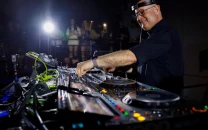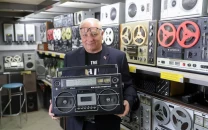How Shiraz Uppal resisted Coke Studio's pressure to feature known faces
Musician gets candid about mentoring new talent, changes in Pakistan’s music industry
1718008106-0/Screenshot-(1079)1718008106-0-640x480.webp)
In an engaging episode of the podcast Excuse Me with Ahmad Ali Butt, renowned Pakistani musician and producer Shiraz Uppal delved into a myriad of topics ranging from the evolution of music to his experiences mentoring young talent and his unique approach while working on Coke Studio. The conversation provided an insightful look into the mind of one of Pakistan's most versatile and influential music figures.
Uppal kicked off the discussion by addressing the significant changes in music consumption and production over recent years. "With the moving times, this is just evolution. That’s how music is," he said, reflecting on the shift towards shorter song durations in contemporary music. He pointed out that today's average song length has shrunk to around two minutes, a stark contrast to the five-minute singles of the past and the era of 12-13 song albums.
"But is the evolution happening?" Butt pondered. In response, Uppal noted that generational differences play a crucial role in shaping musical preferences. "We judge based on our generation but if you ask young people today, they think their music is the best thing. They are not attracted to a five-minute song. They prefer short songs because the retention span generally has dwindled a lot. And you have so many choices."
The artist highlighted how the once prevalent format of full-length albums has nearly disappeared, replaced first by singles and now by much shorter tracks. This evolution, according to Uppal, is a response to the changing listening habits and shorter attention spans of modern audiences.
A new generation
One of the most compelling aspects of Uppal's career has been his role as a mentor and vocal coach for emerging artists. He shared anecdotes about his experiences with some of Pakistan's top singers, revealing his dedication to nurturing their talent.
"I help a lot as a vocal coach because I know their capabilities," he explained. "When you listen to a singer, you can tell the most you can extract from them. Sometimes they themselves are not aware of it." Uppal recounted his work with Aima Baig, a prominent figure in Pakistan’s music scene, who initially specialised in Western singing styles.
"When I made Aima sing Kalabaaz Dil, she didn’t have this tonality. She used to sing Western. So I had to sit her down and teach it to her and she picked up very well. It was only then that she learned that she could sing like this too," Uppal explained.
His mentorship extended to other celebrated artists, including Atif Aslam. "In the beginning, when Atif was entering the field, his voice was very strong but it lacked expression. He didn’t know how to express words which is very important for playback singing. I counselled him a lot that if there’s a word about love, deliver it in a specific way. He picked it up and implemented that."
Uppal's approach to mentoring is inclusive and open-minded, especially towards fresh talent. "I am very open to working with fresh talent. I love to introduce new singers like in Coke Studio, I introduced 6-7 new singers in my songs. However, among new singers, you find very few who are good. Especially female singers are very few in Pakistan."
Despite the abundance of talent hunt programs, Uppal noted that societal pressures often prevent many women who aspire to sing and reach their full potential. "The opportunities are there. There have been so many talent hunt programmes but very few reach the top, probably because of the social pressure. Many people think music isn’t right, you know. ‘What will people say?’”
On his own terms
Uppal's journey with Coke Studio, one of Pakistan's most iconic music platforms, was another highlight of the interview. Known for his distinct methodology, Uppal emphasised his commitment to maintaining his creative integrity while collaborating with Coke Studio.
"No, I didn’t follow anyone else’s method," he said with a laugh when asked about adapting to Coke Studio's process. "There was no discord but I made some things very clear to them that this is the way I work. If you want me, then my work will unfold like this. If I am jamming or rehearsing, you’re not allowed to give your input. The musicians working with me will be of my choosing."
This insistence on creative control led to significant changes in his approach to the show. Uppal revealed that he replaced several members of the house band, who had been part of Coke Studio for eight seasons, to better align with his musical vision. "They were good but I couldn’t understand them so I changed 4-5 musicians for my set."
The composer also addressed the tension between his desire to introduce new voices and Coke Studio's preference for established artists. "Most of the argument was over Coke saying they wanted known faces, known voices. I said if you want known voices, then look at season eight when I produced Tajdar e Haram. Atif sang it and when he’s the one singing, it is a guaranteed hit so what’s to my credit if I give all five songs to known faces in this season. My soul wouldn’t be satisfied."
Have something to add to the story? Share it in the comments below.



















COMMENTS
Comments are moderated and generally will be posted if they are on-topic and not abusive.
For more information, please see our Comments FAQ